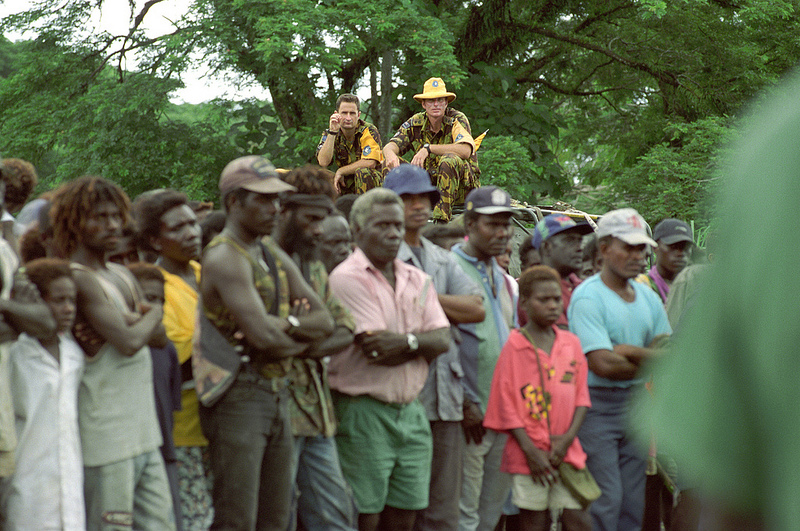Australia’s Bougainville challenge: aligning aid, trade and diplomacy in the national interest
 An ASPI report published this morning sets out a plan to help deliver a sustainable solution for the future of Bougainville.
An ASPI report published this morning sets out a plan to help deliver a sustainable solution for the future of Bougainville.
A decade after the successful peacekeeping mission, and a year and a half before the window opens for a referendum on Bougainville’s political status, the peace process is dangerously adrift.
The pathbreaking unarmed regional peace effort, begun by New Zealand in late-1997 and led by Australia from early 1998 to mid-2003, is cited as a model of innovative and flexible peacemaking. It ensured large-scale fighting didn’t resume and it bought time to prepare for an orderly political settlement. Sadly, those preparations have been insufficient to ensure a workable and sustainable political outcome. The Papua New Guinea Government, donors, neighbours and officials on Bougainville have failed to build the capacity the Autonomous Bougainville Government (ABG) requires to remediate the causes of the earlier conflict.
Although there have been positive developments, most indicators are far from encouraging as the mid-2015 to 2020 window for a referendum approaches. Misunderstandings between Port Moresby and the ABG remain, while economic imperatives to resume mining as the only realistic basis for autonomy or independence add new pressures. Unemployment among young men, damage to social, economic, and physical infrastructure and strong pro- and anti-independence views persist in different areas. At the moment the most likely referendum outcome is a clear-cut but far from unanimous vote for independence, which PNG is likely to refuse to ratify. That’s an outcome that Bougainville is unprepared for, and would be destabilising.
Although the risk of renewed conflict is fundamentally a challenge for PNG and the ABG to manage, Australia has a major stake too. Even if a PNG–ABG stand-off didn’t lead to violence, it would squeeze Australia uncomfortably between impulses to accept the results of a peace process we sponsored and the imperative to stand by the more influential partner, PNG. Our interests would be even sharper if violence re-emerges, given our strategic, business and reputational stake in PNG, potential for disorder to spread, public opinion and our security partners’ expectations.
But a reintervention after mid-2015 could be much larger and more costly—closer to the more complex missions in Solomon Islands or even Timor-Leste—than the limited effort appropriate from 1997-2003. Military aspects of those later interventions cost $350 million and $4.3 billion, respectively, while ten years on we’re still spending $125 million annually on post-conflict reconstruction in Solomon Islands via a scaled-down RAMSI. Renewed violence would also present a more dangerous peacemaking environment than that of 1997-98.
The new Government’s decision to more closely align Australia’s foreign, development, and trade efforts to advance specific interests as well as poverty-reduction could assist. An Australian-led development effort to assist Bougainville is needed to forestall another peacekeeping mission. While this initiative would require greater investment (Bougainville’s current share of PNG aid isn’t much higher than its proportion of the population) such an effort could make up crucial lost ground in areas such as public safety, community awareness and legal, business and administrative capacity.
This categorically wouldn’t seek to replicate the RAMSI-style shadow government necessary following the collapse of governance in the Solomons. Rather, it’d forestall the need for an intrusive reintervention. While dialogue between Port Moresby and the ABG has increased a bit and Australian assistance was starting to rise under AusAID, a much more concerted pre-referendum focus is required and must be coordinated with regional partners. Australian elements would include:
- establishing a high-priority task force to lead the implementation of a strategy for Bougainville
- tripling development assistance to Bougainville from within current aid funding (to around $100 million a year, with offsets from outside PNG’s aid program)
- an emphasis on training the ABG, particularly by Australians willing to mentor the Bougainville Public Service under the Australian Government’s New Colombo Plan
- enhanced Australian Federal Police support for the Bougainville Police
- initiating low-key defence contributions to rebuilding efforts
- international advocacy (including through Australia’s temporary UNSC seat)
- particularly encouraging Pacific island nations’ involvement in a regional solution
- a strong focus on empowering female and community voices for peace
- supporting a closer and more sustained dialogue within PNG.
While PNG sovereignty concerns and some continuing Bougainvillean suspicions about Australia’s motives would need to be handled sensitively, this should be manageable given all sides’ strong interest in preserving peace. Neither autonomy nor independence would be an outcome which would necessarily ensure or exclude the possibility of violence. The essential requirement is that the referendum process is conducted reasonably smoothly, is seen to be legitimate (requiring realistic options to choose between meaningful autonomy or independence), and that all parties can live with the result.
Bougainville presents potential risks and rewards for the new government, but the greatest risks are from Canberra’s inactivity. Alternatively, the rewards for taking a proactive approach are potentially high. Australia has an opportunity to show that we can do more than ‘send in the troops’—that we have the nous and resources to avert the need for military intervention through concerted whole-of-government action to create the conditions for lasting peace. In many ways this would be the missing conclusion to the story of Pacific stabilisation operations begun by the Howard government in Bougainville in 1998. Preventive diplomatic action conducted in close cooperation with our regional partners would establish Australia’s credentials as a peacemaker when the region could use calm and far-sighted leadership.
Peter Jennings is the executive director of the ASPI, and Karl Claxton is an analyst at ASPI. Image by Flickr user Australian Civil-MilitaryCentre.